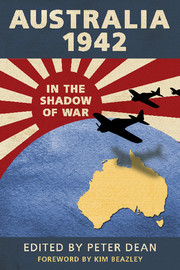Book contents
- Frontmatter
- Foreword
- Contents
- Photos
- Maps
- Charts
- Acknowledgements
- Contributors
- Abbreviations
- Maps
- Introduction
- Part 1 Australia in 1942
- Part 2 Relations, politics and the home front
- Part 3 Australia under threat
- Part 4 The war on Australia’s doorstep
- Chapter 9 Vanquished but defiant, victorious but divided
- Chapter 10 A novel experience
- Chapter 11 On Australia’s doorstep
- Chapter 12 Anzacs and Yanks
- Conclusion
- Index
Conclusion
1942 in reflection
from Part 4 - The war on Australia’s doorstep
Published online by Cambridge University Press: 05 January 2013
- Frontmatter
- Foreword
- Contents
- Photos
- Maps
- Charts
- Acknowledgements
- Contributors
- Abbreviations
- Maps
- Introduction
- Part 1 Australia in 1942
- Part 2 Relations, politics and the home front
- Part 3 Australia under threat
- Part 4 The war on Australia’s doorstep
- Chapter 9 Vanquished but defiant, victorious but divided
- Chapter 10 A novel experience
- Chapter 11 On Australia’s doorstep
- Chapter 12 Anzacs and Yanks
- Conclusion
- Index
Summary
Australia’s experiences in 1942 were just one small part in a global conflict. While the shadows of war merely touched Australia’s shore, millions of people across the globe lived in the darkness that came with Nazi or Japanese occupation. Outside of the Pacific, 1942 also saw a number of critical battles and events. The Allied victory at the second battle of el Alemein (23 October – 4 November 1942) coupled with Operation Torch, the invasion of Morocco, Algeria and Tunisia (8 November 1942), saw the turning of the tide of the war in North Africa, while the battle for the Atlantic continued to see-saw. In Eastern Europe, where the bulk of the German military effort was directed, Hitler’s forces suffered a devastating defeat at the battle of Stalingrad (21 August 1942 – 2 February 1943). In the air 1942 also saw the Allied strategic bombing offensive against Germany swing into full action when, on the night of 30–31 May 1942, the RAF launched its first 1000-bomber raid on the German town of Cologne. One thousand and forty-six aircraft rained more than 2000 tonnes of bombs on the city, reducing 13 000 houses to rubble. In the Pacific, tens of thousands of Allied military personnel became prisoners of war of the Japanese, while the Sino-Japanese war in China continued unabated, occupying the bulk of the Japanese Army. Yet, while the Second World War was global in nature, its ramifications were felt most significantly at the local level.
Speaking in Federal Parliament on 27 January 1943, Prime Minister John Curtin reflected on what had been achieved during the year to ‘save this country from invasion’ and to ‘protect our own soil’. The successes were self-evident. ‘Nowhere in Australia last night’, he continued, ‘did people fear that air-raid warnings would interrupt their slumber or work.’
- Type
- Chapter
- Information
- Australia 1942In the Shadow of War, pp. 240 - 241Publisher: Cambridge University PressPrint publication year: 2012

